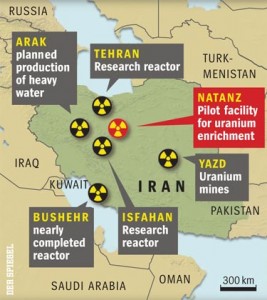The UN atomic agency said Tuesday it will hold a new round of talks with Iran on May 15 in Vienna on suspected nuclear bomb-making efforts by Tehran, AFP reports.

The meeting is “aimed at finalizing a structured approach to resolving outstanding issues related to the possible military dimensions of Iran’s nuclear program,” International Atomic Energy Agency spokeswoman Gill Tudor said, according to AFP.
Iran has consistently rejected as unfounded what the IAEA calls “overall, credible” evidence that until 2003 and possibly since, it conducted nuclear weapons research.
Iran denies wanting or ever having sought the bomb, and accuses the IAEA of basing its conclusions on faulty intelligence from foreign spy agencies — intelligence it complains it has not been allowed to see.
Nine rounds of talks since the publication of a major IAEA report in November 2011 on these alleged activities have produced no breakthrough. The last was held in February.
Parallel diplomatic efforts between Iran and six major powers — the U.S., China, Russia, Britain, France and Germany, known collectively as the P5+1 — are focused more on Iran’s current activities.
The latest round with the P5+1 in Almaty, Kazakhstan in early April ended with chief negotiator and EU foreign policy head Catherine Ashton saying the two sides remained “far apart”.
The IAEA conducts regular inspections of Iran’s declared nuclear sites and its quarterly reports routinely outline advances in its atomic program in spite of UN Security Council resolutions calling for a suspension.
Its latest report, issued February 21, said that Iran had begun installing at its Natanz plant more advanced centrifuges to speed up uranium enrichment, a process at the heart of the international community’s concerns.
Enriched uranium can be used for peaceful purposes but also, in highly purified form, in a nuclear weapon.
Mark Fitzpatrick, analyst at the International Institute for Strategic Studies in London, was pessimistic about the upcoming IAEA negotiations.
“After so many fruitless meetings with the IAEA to date, and particularly after the disappointing meeting in Almaty … there is no reason to expect that Iran will finally agree to a plan for addressing the outstanding questions,” Fitzpatrick told AFP.
“The IAEA is persistent in asking for a means of resolving the issues, but Iran is stubbornly insisting on tying its IAEA obligations to sanctions relief on the diplomatic track,” he added.
The new meeting between Iran and the IAEA comes ahead of the release in late May of the agency’s latest quarterly report, which like previous reports is expected to show that Tehran has continued to expand its nuclear program.
In particular, diplomats told AFP, the report will likely say that Iran has put in more than 500 newer model “IR-2m” centrifuges at its Natanz uranium enrichment plant.
On Sunday, IAEA deputy director Rafael Grossi, one of the top officials in negotiations with Iran, announced his resignation.
No reasons were given for the Argentinian’s resignation, which comes as chief inspector Herman Nackaerts of Belgium prepares to retire later this year.
Source material can be found at this site.









